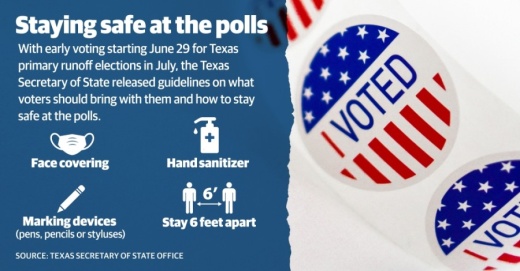Texas Secretary of State Ruth Hughs released a checklist May 26 for voters to follow to help prevent the spread of the coronavirus at polling stations. Early voting for July 14 primary runoff elections is set to start June 29.
Among the practices recommended by the checklist are self-screening for symptoms, maintaining 6 feet of separation between individuals and using appropriate hygiene etiquette.
The checklist also details what voters should consider bringing to the polls, such as face coverings, marking devices like pens or pencils and hand sanitizer to disinfect oneself after interactions with polling stations or workers.
However, the guidelines stipulate that if an election judge is not able to identify a voter in a face covering, the individual should be prepared to lower or remove it when checking in.
Voters exhibiting any symptoms of the coronavirus are encouraged to make use of curbside polling, which is available at every polling location, according to the checklist. Some symptoms include coughing, shortness of breath, chills or a temperature of more than 100 degrees.
Voters that are at a higher risk for the coronavirus should consider staying home and submitting an application for a ballot by mail through their county election offices, according to the secretary of state's office.
According to a Texas 14th District Court of Appeals decision on May 14, voters across Texas who lack immunity to coronavirus would qualify to vote by mail ballot in upcoming elections. However, a federal appeals court put that ruling on hold, Community Impact Newspaper previously reported.
Other recommendations for in-person voting include: adding floor markings to allow voters to remain 6 feet apart; keeping voting stations 6 feet apart; blocking off frequently touched items that are not being used; regularly cleaning and disinfecting touched surfaces like tables and doorknobs; making sanitizer available for workers and voters; and providing signage indicating the best hygiene practices.
The checklist also includes a disclaimer, stating that public health guidance cannot anticipate every unique situation. The guidelines state that individuals should "stay informed and take actions based on common sense and wise judgment that will protect health and support economic revitalization.”




